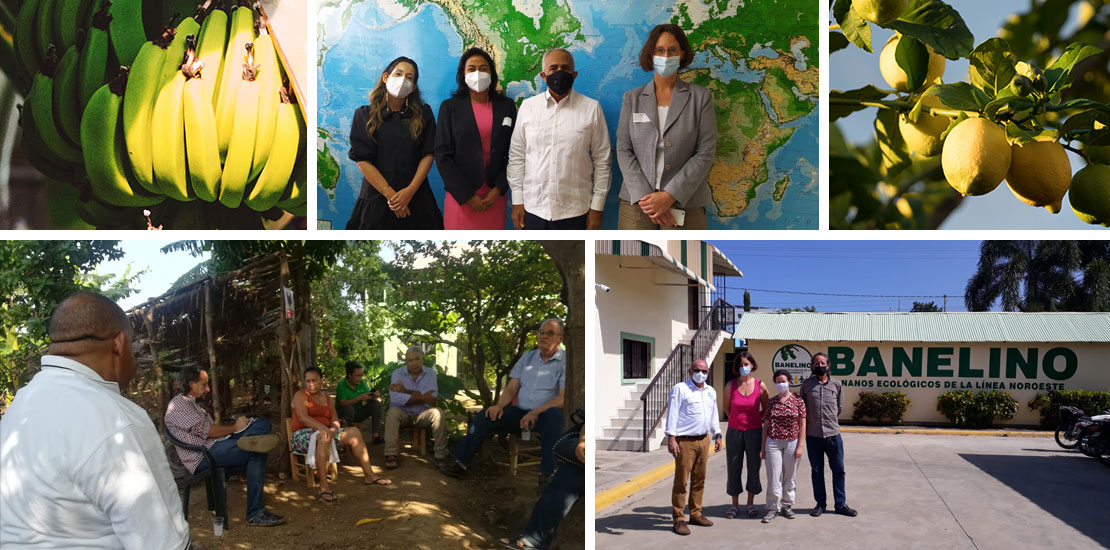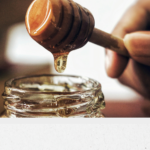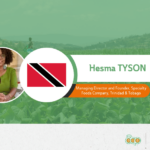Dominican Republic: Supporting organic banana and citrus production
- 15/12/2021
- Posted by: Gaetan Dermien
- Category: Bananas, Caribbean, Citrus fruits, Dominican Republic, News

On 29 October COLEACP met with representatives of two banana producers’ associations, Banelino and Adobanano, and a citrus producers’ association, Sosbiolim, in the region of Mao, to better understand their needs and to review priorities for action.
The Dominican Republic is the world’s largest producer of organic bananas: 55% of all organic bananas are grown in the country, and 95% of them are exported to the EU. The experiences of the country’s banana producers – their methods, processes and results – can reveal the successes and challenges of the shift to organic banana production.
The Fit For Market SPS programme, implemented by COLEACP, aims to equip smallholders, farmer groups and MSMEs to access international and domestic markets, through helping them to comply with sanitary and phytosanitary requirements.
In the Dominican Republic, COLEACP engaged with Banelino, Adobanano and Sosbiolim to discover whether Fit For Market SPS can address any of the producers’ needs that are not already covered by other programmes. COLEACP’s Marie-Hélène Kestemont (Geographical Coordinator) and Laura Wauters (Project Manager) met with representatives of the three associations.
Established in 1996, Banelino represents 336 small-scale producers (each of whom farms around 3 ha) in the NorthWest Line of the Dominican Republic, close to the border with Haiti. Every week, Banelino’s members export about 450 tons of bananas, 98% of which are destined for the European Union (the remaining 2% goes to the USA). This is the equivalent of around 24,000 tons of bananas per year.
Banelino’s members are partners in the organisation, which is led by a Board of Directors. Women occupy most of the management positions and comprise 30% of the membership. In supporting its members, Banelino particularly focuses on creating opportunities for women and young people.
Over several years, COLEACP has established a productive and positive working relationship with Banelino, which has participated and given presentations in several COLEACP webinars organised for the Caribbean region. As a result of this constructive relationship, Banelino has recently expressed interest in becoming a member of COLEACP.
Gustavo Gandini, Technical Director of Banelino’s ABIOMA Department, described some of the organisation’s initiatives – and current and future challenges. Banelino’s members currently face challenges in complying with organic production requirements. Requirements for the analysis of pesticide residues have recently increased, but a lack of accredited laboratories in the Dominican Republic means that many samples must be sent to other countries for testing. There is also some uncertainty around interpreting the results of these tests and of soil sample analysis. But in more positive news for producers, a laboratory at the Dominican Institute of Agriculture is expected to become accredited soon.
Banelino is also interested in COLEACP’s training offer (including practical field training), advice on recent regulations, particularly including around organic production, and support for building business plans. The association is also keen for COLEACP to represent its members in discussions within the European Community, which is seen as very valuable.
The mission to the Dominican Republic was also an opportunity for the first in-person contact between COLEACP and representatives of Adobanano and Sosbiolim. Adobanano is a non-profit umbrella company with about 2,000 members, including independent banana producers, associations and exporters.
For Sosbiolim, the meeting focused on the Lemon Cluster – bringing together representatives from all along the value chain – and was held at a lemon farm in Piloto. Currently, only two lemon exporters in the country are certified organic. One ongoing challenge for lemon producers is to comply with EU regulations, in place for the past two years, requiring additional measures and information concerning fruit flies.
At a scheduled meeting between officials of the Ministry of Agriculture, including Vice Minister of Rural Development Miriam Guzman, and representatives of the Lemon Cluster, COLEACP’s work and potential programme support were presented. The Vice-Minister was particularly interested in the possibility of launching a COLEACP training programme, potentially focusing on organic production.
COLEACP looks forward to continuing these working relationships with both private and public sectors in the Dominican Republic.
This activity is supported by the Fit For Market and Fit For Market SPS programmes, implemented by COLEACP within the Framework of Development Cooperation between the Organisation of African, Caribbean and Pacific States (OACPS) and the European Union, and co-funded by the French Development Agency (AFD).




![EU and GB MRL changes in 2025 (January-March 2025) 9-FFM+-[ENG]](https://news.colead.link/wp-content/uploads/2024/06/9-FFM-ENG-150x150.jpg)
